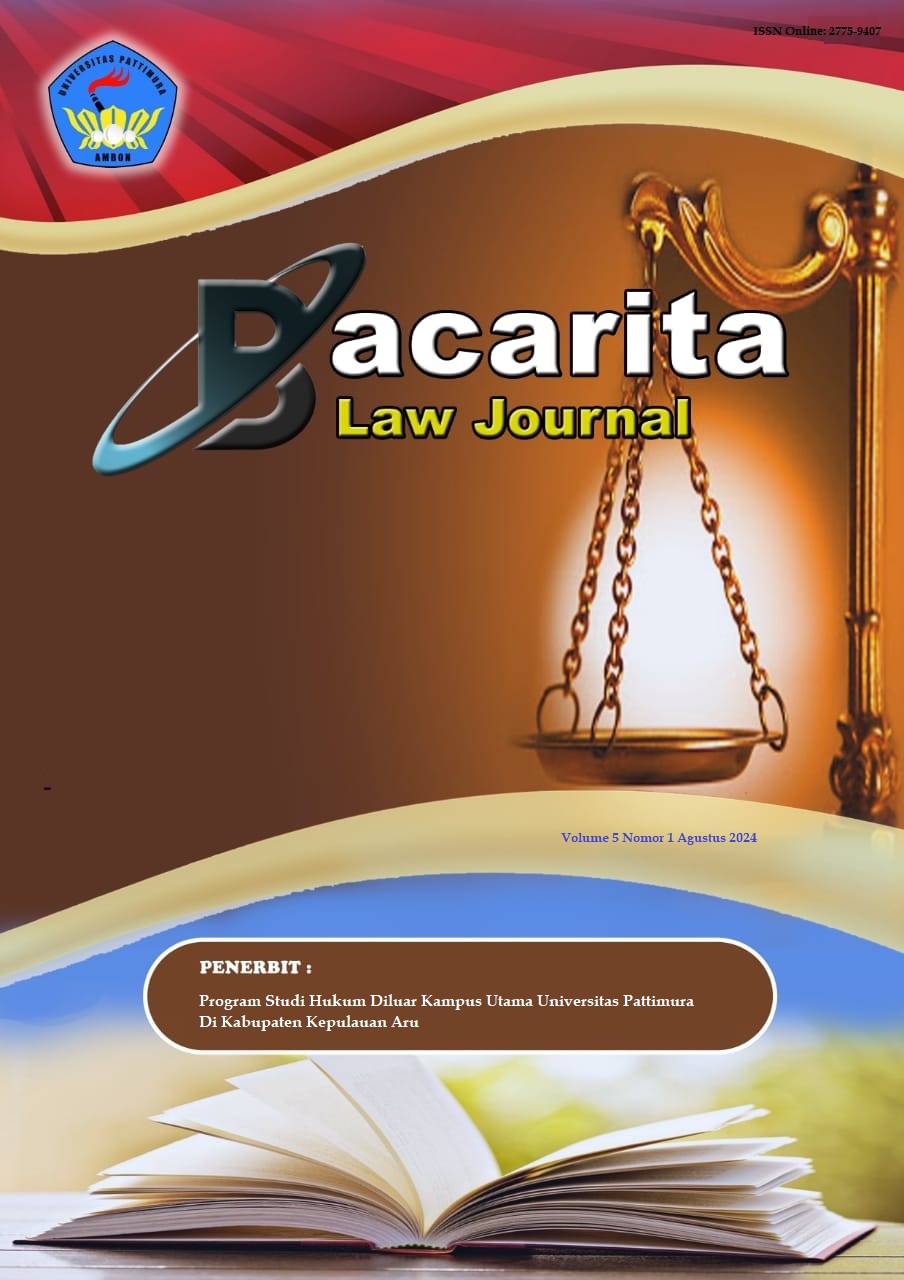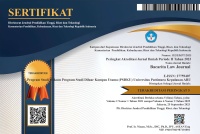Pertanggungjawaban Hukum Terhadap Anak Sebagai Pelaku Tindak Pidana Pencurian
Abstract
The theft committed by children must have several factors, namely several economic components or factors, parents because they do not pay attention to their children and thus commit acts against the law, social factors, and mass media factors. A child is a person who is not yet competent or a minor. What is called a child is a child who is not yet 18 years old and includes shildren who are still in the womb. This research aims to find out who is legally responsible for violations committed by children of theft according to Indonesian law, the factors that cause theft in cases involving Decision Number 1/Pid.Sus-Anak/2023/Pn Bpp. A normative approach, such as literature research based on laws and cases, is used in this research, these legal resources are classified into primary, secondary and tertiary. The results of this research are that children must be able to take responsibility for their actions which cause unlawful acts and child perpetrators must be imprisoned and trained in Special Children’s Correctional Institutions. Apart from that, social, economic, mass media (which is influenced by electronic media), and parental factors contribute to teenager committing illegal acts of theft. The judge then made a decision in case number 1/Pid.Sus-Anak/2023/PN BPP. It is appropriate to apply Article 363 paragraph (1) to 3 in conjunction with Article 65 paragraph (1) of the Criminal Code, but the sentence received by the child is too light, even thought this minor is protected, the criminal sanctions given should not be too light so that the child gets a deterrent effect, because the child has committed theft many times, causing disturbance to resident and harming other people.
Downloads
References
Buku
Adi Papa Putra, Deddy R. CH. Manafe, dan Adrianus Djara Dima, Tinjauan Kriminologis Terhadap Tindak Pidana Pencurian Yang Dilakukan Oleh Anak, Tahun 2023.
Ahmad Ansori Pratama, Tanggung Jawab pidana Anak Sebagai Pelaku Pencurian Terkait Kekerasan yang Mengakibatkan Kematian. Tahun 2019.
Albertus Otomosi Laia, Muhammad Abdul Basir Lubis & Gomgom T.P Siregar, Pertanggungjawaban Hukum Terhadap Anak Yang Melakukan Tindak Pidana Pencurian, Tahun 2022.
Andi Saputra Sitompul, Pembelaan Hukum bagi Siswa yang Terlibat Bullying Verbal di Sekolah Menengah Atas, Tahun 2021.
Aziz Satrio Prabowo, Upaya Polrestabes Kota Semarang Dalam Menganggulangi Tindak Pidana PEncurian Dengan Kekerasan Oleh Anak, Tahun 2022.
Bambang Sarutomo, Alasan Remaja Melakukan Kejahatan Pencurian di Kabupaten Demak, Tahun 2021.
Daud Hidayat Lubis, Menurut Hukum Pidana Islam dan Positif , Tanggung Jawab Pidana Anak, Tahun 2016.
Endry Bagus Prasityo, Mila Irawati, Dewi Chrisma Lasmaria, dan Yulius Hermawan, Penyebab Anak Melakukan Tindak Pidana Di unit PPA Satreksrim Polres Tanjungpinang, Tahun 2021.
Fajrul Umar Hidayat, Pembelaan Hukum Terhadap Penganiayaan Non Fisik dan Fisik Terhadap Anak (Bullying) Sesuai dengan Undang-Undang Nomor 35 Tahun 2014 Pasal 54 Tentang Perlindungan Anak, Tahun 2019.
Ida Bagus Agung Pariama Manuaba, I Nyoman Sujana, Ni Made Sukaryati Karma, Pertimbangan Hakim dalam Menjatuhkan Pidana Terhadap Pencurian yang Dilakukan Oleh Anak Dengan Pencurian Berat, Tahun 2020.
Kausar dan Tarmizi, Pertimbangan Hakim saat Memvonis Remaja Pelaku Pencurian, Tahun 2021.
Khairu Ihsan, Faktor Penyebab Anak Melakukan Tindakan Kriminal, Tahun 2016.
Michael Barama dan Boby Pinasang, Pemidanaan Terhadap Anak Menurut Hukum Pidana Di Indonesia, Tahun 2021.
R. Wiyono, S.H, Sistem Peradilan Anak di Indonesia, Tahun 2016.
Rahmad Alamsyah, Pandangan Hukum Pidana Positif di Indonesia dan Hukum Pidana Islam Terhadap Remaja yang Melakukan TIndak Pidana, Tahun 2020.
Rini Vovriyanti, S.Pd., M.Pd. Faktor-Faktor yang Mendorong Anak Melakukan Kejahatan di Lembaga Pemasyarakatan Anak Tanjung Pati, Tahun 2017.
Ronald Christian Tersiar Tarigan, Pemeriksaan Terhadap Faktor-Faktor Hukum Mendasar yang Dipertimbangkan Hakim Saat Menegakkan Kejahatan yang Kurang Serius Dibandingkan Penuntutan Pembunuhan, Tahun 2021.
Tutut Chusniyah, Penyebab Kenakalan dan Kriminalitas Anak, Tahun 2014.
Skripsi, Tesis, Distertasi, Online/World Wide Web dan Lain-Lain
Ady Thea DA, Tujuan Sistem Peradilan Pidana Anak, Tahun 2023. https://www.hukumonline.com/berita/a/advokat-ini-beberkan-tujuan-sistem-peradilan-pidana-anak-lt6402cf80ee678/.
Copyright (c) 2024 Hardiki Febriyandi, Surahman Surahman

This work is licensed under a Creative Commons Attribution-NonCommercial 4.0 International License.
Authors who publish their manuscripts in this Journal agree to the following conditions:
- The copyright in each article belongs to the author, as well as the right to patent.
- Authors are able to enter into separate, additional contractual arrangements for the non-exclusive distribution of the journal's published version of the work (e.g., post it to an institutional repository or publish it in a book), with an acknowledgment of its initial publication in this journal.
- Authors are permitted and encouraged to post their work online (e.g., in institutional repositories or on their website) prior to and during the submission process, as it can lead to productive exchanges, as well as earlier and greater citation of published work.
- Authors have the right to self-archiving of the article (Author Self-Archiving Policy)















